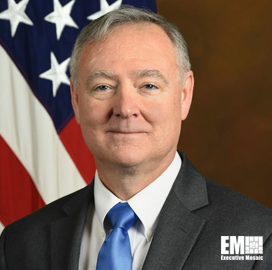In March 2020, the White House released its National Strategy to Secure 5G of the United States to frame how the nation will safeguard 5G wireless infrastructure at home and across the globe. The new law directs the president to produce a strategy “to ensure security of next generation wireless communications systems and infrastructure,” within 180 days of its enactment.
5G wireless technology is anticipated to unleash unprecedented levels of connectivity between millions of new internet of things devices and there are already a range of deployments making their way across the U.S. and in a few federal agencies.
During Potomac Officers Club’s 5G Summit, Dr. Joe Evans, principal director for 5G, reporting directly to the Under Secretary of Defense for Research and Engineering within the Office of the Secretary of Defense, will be featured as the keynote speaker.
Evans will discuss the impact that innovative technologies and 5G integration have on the private and public sectors, the steps the federal agencies have taken to remain up to speed with the rapid advancement of technology, and the future programs, plans and priorities as the nation aligns with emerging technology.
To register for Potomac Officers Club’s 5G Summit, as well as see upcoming opportunities, visit Potomac Officers Club’s Event Page.


The DoD has recently announced its plans to issue additional requests for proposals (RFPs) in the coming weeks for 5G wireless prototypes at a second tranche of U.S. military bases. New RFPs will be issued through the National Spectrum Consortium and Information Warfare Research Program.
“DoD recognized that industry is driving 5G technology with massive investments,” said Evans. “The projection on capital expenditure in the U.S. through 2025 is about $350 billion.”
Joint Base San Antonio and other remote sites have formed a 5G core security experimentation network for evaluating the security and interoperability of 5G backbone networks. The tests could help additional U.S. companies enter the 5G market, Evans added.
Additionally, in Nov. 2020, Evans stated that the U.S. military will leverage 5G networks on battlefields abroad may consider adopting commercial 5G, and select components that could be integrated into military tactical networks overseas.
“As we get closer to the tactical edge, and either in parts of the world where the infrastructure is … not necessarily trustworthy… or actually in a contested tactical environment against a peer adversary, that’s where we think that there’s some challenges,” Evans said Wednesday at an ACT-IAC conference. “That’s where we have to start looking at … what bits and pieces of 5G we can use.”
“There’s mixes and matches of some of the underlying technologies that we think will be useful in the tactical environment,” he added.
The Pentagon made $600 million in awards in early October to support 5G testing and experimentation projects with 15 companies at five U.S. military installations and Evans provided updates on those projects.


“The Department of Defense is at the forefront of cutting edge 5G testing and experimentation, which will strengthen our Nation’s warfighting capabilities as well as U.S. economic competitiveness in this critical field,” said Michael Kratsios, acting undersecretary of defense for research and engineering and U.S. chief technology officer and 2020 Wash100 Award recipient.
As the DoD moves toward adaptation and integration of 5G technologies, The 2021 National Defense Authorization Act (NDAA), which the House passed in Dec. 2020, will develop a 5G cross-functional team inside the Defense Department.
The NDAA will shift the 5G project from the research phase to an operational program. Following the DoD’s announcement of $600 million in funds to support 5G experiments at military bases across the nation, the experiments have the potential to become operational technologies.
If signed into law, the NDAA would direct the undersecretary of defense for research and engineering, with support from the 5G cross-functional team, to create a plan for transitioning 5G wireless technology to operational use within the DoD.
Join Potomac Officers Club’s 5G Summit to hear notable federal and industry leaders further discuss emerging programs, priorities and challenges within the integration process of the new 5G framework. As emerging technologies continue to become an integral part of business and innovation, leaders across all divisions must stay ahead of the curve to tackle national and global issues.
To register for the 5G Summit, and view other upcoming events, visit Potomac Officers Club’s Event Page!








